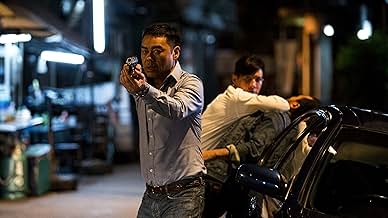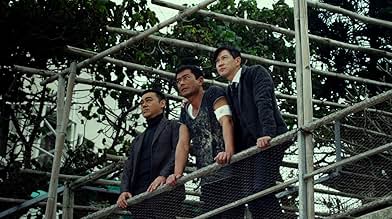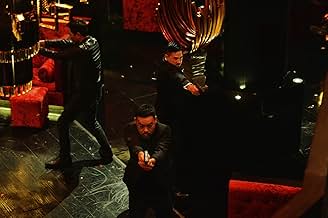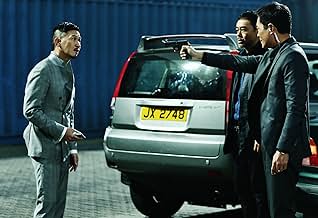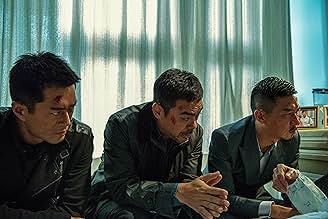A devastating dilemma changes the fate of three cops when an undercover operation against a notorious Thai drug lord goes horribly wrong.A devastating dilemma changes the fate of three cops when an undercover operation against a notorious Thai drug lord goes horribly wrong.A devastating dilemma changes the fate of three cops when an undercover operation against a notorious Thai drug lord goes horribly wrong.
- Awards
- 4 wins & 23 nominations total
Ching-Wan Lau
- Ma Ho-tin
- (as Sean Lau)
Ting Yip Ng
- Wong Shun-yik
- (as Ng Ting-Yip Berg)
Wai-Kwong Lo
- Bobby
- (as Kenneth Low)
Helena Law
- Tsz-wai's Mother
- (as Lan Law)
Treechada Petcharat
- Mina
- (as Poy)
Hugo Tsz-Hang Wong
- Monkey (Kun's Gang)
- (as Hugo Wong)
Siu-Kay Lee
- Kei (Informer)
- (as Siu-Kei Lee)
Featured reviews
THE WHITE STORM is another big Hong Kong action blockbuster, directed by Benny Chan of WHO AM I? Fame. This one stars three big beasts in the form of Louis Koo, Sean Lau and Nick Cheung, and all three are on good form. The film itself seems to have been made as a homage to John Woo's BULLET IN THE HEAD, featuring as it does a trio of cops who head off to Thailand to bring down a massive drug lord known as the Eight-Headed Buddha. What follows is a story is a story of betrayal and heroism, focusing on the usual bromance found in this genre. Sadly, the running time is far too long which means that some of this is pure melodrama and goes on and on at the expense of the action. I still enjoyed it, but I can't say it's one I'd revisit. Let's hope the sequels pick things up...
How often do you get the chance to see three of Hong Kong's most charismatic male actors - Sean Lau, Louis Koo and Nick Cheung - on the big screen together? And just for that very reason, you're probably entitled to go into Benny Chan's crime thriller with high expectations. Yet even though the triumvirate does not disappoint one bit, everything else about the movie set against the backdrop of the fight against illegal narcotics simply comes off underwhelming, so much so that you can't quite help but feel that their combined star wattage is somehow wasted.
No less than five writers have been credited for the sprawling narrative, which casts Lau, Koo and Cheung as childhood best friends who have since graduated into police officers of the narcotics bureau. Lau plays the de facto leader of the group, the most ambitious and headstrong of the lot, who in his role as Chief Inspector Tin also wields authority over his friends. On the other hand, Koo's Chow has been deep undercover amongst the drug dealing triads for some time now, and since risen amongst the ranks to be Hak Tsai's (Ben Lam) right hand man. But he's also disillusioned, especially with his wife expecting a baby, and wants out immediately.
Co-written by Chan himself, the script pits Tin against Chow when a sting operation supposed to be Chow's last mission is aborted at the last minute. The higher-ups want Chow to continue undercover so they can bait a larger fish - the infamous kingpin named Eight Faced Buddha (Lo Hoi Pang) of the Golden Triangle – and Tin reminds Chow of his obligation as a police officer to obey orders. Compared to Tin and Chow, Cheung's role as the soft-spoken Wai only becomes clearer at this point - he's the pacifist among the lot, the one urging calm and reason as Tin and Chow butt heads with each other.
Despite some strong initial reservations, Chow reluctantly accepts his orders to follow Hak Tsai into Bangkok to make contact with the Eight- Faced Buddha via a local dealer (Ken Lo). Needless to say, that operation set in the middle of a dense forested region ends badly - not only does Tin lose one of his men (Ng Ting Yip), he is also eventually forced to make a choice between the devil and the deep blue sea. That impossible moral dilemma at the halfway mark also marks the high point of the movie – not only is it the single most emotionally intense moment, it also marks the culmination of what is easily the most thrilling action sequence of the film.
Structured as two acts, the close of this chapter with a literal bang also represents the point at which the movie quickly goes downhill. A fundamental twist two-thirds into the film that sees the return of a key character from the dead is clichéd to say the least, not to mention the resolution that plots the trio's final showdown with Buddha at a nightclub in Macau. The character beats hardly make up for the plotting - in particular, every moment meant to be poignant seems to proceed on the mistaken notion that it must be a high strung one, meaning that the characters are consistently forced to confront each other by shouting and jostling.
Chan's direction here is also to blame. There is absolutely no subtlety to be found here, with Chan finding it necessary at every turn to crank the volume and the intensity of every scene to maximum. Not only does that make for plenty of cringe-worthy melodrama, it also creates too many moments of unnecessary histrionics. The lack of restraint applies as well to the overindulgent plot, which comes off unintentionally amusing at turns for being pure cliché. And nowhere is the excessiveness more apparent than in the final shootout, which aims for the kind of operatic grandeur associated with Johnnie To gangster movies (think 'Exiled') but falls far short by being simply too ridiculous; indeed, the sheer absurdity of that bullet-riddled showdown undermines what credibility the brotherhood-in-peril narrative had left, which ultimately rings hollow.
Just about the only element - or rather elements - holding the film together are the solid performances of the lead actors. Lau and Cheung prove yet again why they are the best actors of their generation, and despite the film's tendencies, both know absolutely better than to overplay their characters, displaying both nuance and depth in their acting. Koo has, despite his best efforts, never quite been in the same league as his two other male co-stars. His deficiencies as an actor are even more stark - especially in certain scenes where he is called upon to emote, there is a genuine sense that he is trying and perhaps trying too hard.
It's a thorough pity therefore, that despite gathering some of the best acting talents from Hong Kong, this bombastic narco-thriller fails to be as compelling as it should be. Part of the fault lies with the messy script, lacking in the discipline and focus necessary to distil a gripping story of three friends whose bond of brotherhood is put to the test; while another part of the fault also lies with Chan's distinct lack of awareness for excess, and whether in terms of drama or action, the tone is obstinately over-the-top. It isn't Chan's finest moment that's for sure, and seeing as how there is no shortage of similar thrillers like 'Drug War' or 'Protégé', this latest addition is worthwhile only for being the rare opportunity to watch three of Hong Kong's finest actors share the screen together.
No less than five writers have been credited for the sprawling narrative, which casts Lau, Koo and Cheung as childhood best friends who have since graduated into police officers of the narcotics bureau. Lau plays the de facto leader of the group, the most ambitious and headstrong of the lot, who in his role as Chief Inspector Tin also wields authority over his friends. On the other hand, Koo's Chow has been deep undercover amongst the drug dealing triads for some time now, and since risen amongst the ranks to be Hak Tsai's (Ben Lam) right hand man. But he's also disillusioned, especially with his wife expecting a baby, and wants out immediately.
Co-written by Chan himself, the script pits Tin against Chow when a sting operation supposed to be Chow's last mission is aborted at the last minute. The higher-ups want Chow to continue undercover so they can bait a larger fish - the infamous kingpin named Eight Faced Buddha (Lo Hoi Pang) of the Golden Triangle – and Tin reminds Chow of his obligation as a police officer to obey orders. Compared to Tin and Chow, Cheung's role as the soft-spoken Wai only becomes clearer at this point - he's the pacifist among the lot, the one urging calm and reason as Tin and Chow butt heads with each other.
Despite some strong initial reservations, Chow reluctantly accepts his orders to follow Hak Tsai into Bangkok to make contact with the Eight- Faced Buddha via a local dealer (Ken Lo). Needless to say, that operation set in the middle of a dense forested region ends badly - not only does Tin lose one of his men (Ng Ting Yip), he is also eventually forced to make a choice between the devil and the deep blue sea. That impossible moral dilemma at the halfway mark also marks the high point of the movie – not only is it the single most emotionally intense moment, it also marks the culmination of what is easily the most thrilling action sequence of the film.
Structured as two acts, the close of this chapter with a literal bang also represents the point at which the movie quickly goes downhill. A fundamental twist two-thirds into the film that sees the return of a key character from the dead is clichéd to say the least, not to mention the resolution that plots the trio's final showdown with Buddha at a nightclub in Macau. The character beats hardly make up for the plotting - in particular, every moment meant to be poignant seems to proceed on the mistaken notion that it must be a high strung one, meaning that the characters are consistently forced to confront each other by shouting and jostling.
Chan's direction here is also to blame. There is absolutely no subtlety to be found here, with Chan finding it necessary at every turn to crank the volume and the intensity of every scene to maximum. Not only does that make for plenty of cringe-worthy melodrama, it also creates too many moments of unnecessary histrionics. The lack of restraint applies as well to the overindulgent plot, which comes off unintentionally amusing at turns for being pure cliché. And nowhere is the excessiveness more apparent than in the final shootout, which aims for the kind of operatic grandeur associated with Johnnie To gangster movies (think 'Exiled') but falls far short by being simply too ridiculous; indeed, the sheer absurdity of that bullet-riddled showdown undermines what credibility the brotherhood-in-peril narrative had left, which ultimately rings hollow.
Just about the only element - or rather elements - holding the film together are the solid performances of the lead actors. Lau and Cheung prove yet again why they are the best actors of their generation, and despite the film's tendencies, both know absolutely better than to overplay their characters, displaying both nuance and depth in their acting. Koo has, despite his best efforts, never quite been in the same league as his two other male co-stars. His deficiencies as an actor are even more stark - especially in certain scenes where he is called upon to emote, there is a genuine sense that he is trying and perhaps trying too hard.
It's a thorough pity therefore, that despite gathering some of the best acting talents from Hong Kong, this bombastic narco-thriller fails to be as compelling as it should be. Part of the fault lies with the messy script, lacking in the discipline and focus necessary to distil a gripping story of three friends whose bond of brotherhood is put to the test; while another part of the fault also lies with Chan's distinct lack of awareness for excess, and whether in terms of drama or action, the tone is obstinately over-the-top. It isn't Chan's finest moment that's for sure, and seeing as how there is no shortage of similar thrillers like 'Drug War' or 'Protégé', this latest addition is worthwhile only for being the rare opportunity to watch three of Hong Kong's finest actors share the screen together.
Just watched the movie, it was damn awesome! Worth it watching I love the movie the best EVER WOW love this movie
There is no shortage of Hong Kong films dealing with undercover cops deep in the mire of drug-trafficking gangs. And there also isn't a shortage of these films that focus more on the aspect of brotherhood rather than on the actual task of bringing the drug lords to justice. So what - if anything - makes 'The White Storm' stand out from the pack? To be honest, not a great deal - but that doesn't mean you won't be entertained and have some fun along the way.
In the finest tradition of 80s HK crime cinema, 'The White Storm' drips sentimentality and brotherhood right from the get go: undercover cop Kin-chow (Louis Koo) has been on the inside of a powerful drug-running gang for years and, with a baby on the way, is keen to get out. His fellow team members and childhood friends Ho-tin (Ching Wan Lau) and Tsz-wai (Nick Cheung) know they are close to getting their man and need Kin-chow to stay put. But when the opportunity comes up for the Hong Kong Police to fry an even bigger fish, the three friends find themselves in an explosive situation that will push their loyalties and friendship to the limit.
So a fairly standard plot as far as these things go but the three leads do a good job of wringing the most out of it. Despite some overly melodramatic moments - which seems to come with the territory in these kind of films - each of the leads gets enough of an opportunity to shine as their story arcs are padded out (and speaking of melodrama, a quick mention for the performance of Hoi-Pang Lo as the bad guy. It's as cliché and hammy as anything but somehow appropriate). Whilst the narrative feels a bit over long and gets dangerously close to being overly convoluted, you do feel enough of an attachment for each of the characters to follow them through on their journey. Some tightening up of the script would have paid wonders here.
But the story provides an adequate vehicle for some entertaining action set pieces. It's predominantly guns instead of fisticuffs here and whilst there's nothing that hasn't been seen before, each set piece is choreographed and shot with such gusto that you can't help but sit back and enjoy - even when things get (waaaay) over-the-top. But hey, that's part of the reason we watch these kind of films, right? I usually find Benny Chan's films a bit hit-and-miss because of either some ham-fisted bit of direction, an unnecessary amount of exposition and/or an out-of-place set piece - but here it works as a kind of pastiche of old school HK crime films. Whilst 'The White Storm' doesn't reach the heights of classic 80s HK cinema, there is definitely some fun to be had if you're in the mood for a good old brotherly shoot out.
In the finest tradition of 80s HK crime cinema, 'The White Storm' drips sentimentality and brotherhood right from the get go: undercover cop Kin-chow (Louis Koo) has been on the inside of a powerful drug-running gang for years and, with a baby on the way, is keen to get out. His fellow team members and childhood friends Ho-tin (Ching Wan Lau) and Tsz-wai (Nick Cheung) know they are close to getting their man and need Kin-chow to stay put. But when the opportunity comes up for the Hong Kong Police to fry an even bigger fish, the three friends find themselves in an explosive situation that will push their loyalties and friendship to the limit.
So a fairly standard plot as far as these things go but the three leads do a good job of wringing the most out of it. Despite some overly melodramatic moments - which seems to come with the territory in these kind of films - each of the leads gets enough of an opportunity to shine as their story arcs are padded out (and speaking of melodrama, a quick mention for the performance of Hoi-Pang Lo as the bad guy. It's as cliché and hammy as anything but somehow appropriate). Whilst the narrative feels a bit over long and gets dangerously close to being overly convoluted, you do feel enough of an attachment for each of the characters to follow them through on their journey. Some tightening up of the script would have paid wonders here.
But the story provides an adequate vehicle for some entertaining action set pieces. It's predominantly guns instead of fisticuffs here and whilst there's nothing that hasn't been seen before, each set piece is choreographed and shot with such gusto that you can't help but sit back and enjoy - even when things get (waaaay) over-the-top. But hey, that's part of the reason we watch these kind of films, right? I usually find Benny Chan's films a bit hit-and-miss because of either some ham-fisted bit of direction, an unnecessary amount of exposition and/or an out-of-place set piece - but here it works as a kind of pastiche of old school HK crime films. Whilst 'The White Storm' doesn't reach the heights of classic 80s HK cinema, there is definitely some fun to be had if you're in the mood for a good old brotherly shoot out.
It has been a long time since I last watch a good heroic bloodshed genre flick. Nobody does it quite like John Woo in the 80s. The brotherhood is more important than romantic love or even familial love, the homo-heroic over-the-top orgasmic gun ballets and the prevailing notion of "to die a good death is beautiful." They are all here... I miss watching these action flicks that teach you how to be a man (one type of man) so much. The only major exponent now is Johnnie To but his emphasis on style robs the genre's quintessential central focus on loyalty and honor.
The White Storm totally surprised me and it is extremely entertaining from start to end. Prior to walking into the cinema, I really don't think much of it because it's another drug movie (Johnnie To's Drug War is still very fresh in my head) and it's a subject matter that is just too jaded. The only reason I wanted to watch this is because of the incredible heavyweight cast of Sean Lau, Nick Cheung and Louis Koo. These 3 awesome actors have never shared the big screen together. But from the get-go, Benny Chan, the director held on to my jugular and kept squeezing it with twists after turns.
The action set-pieces use the locations very well. From the night market streets of Mongkok, to dilapidated sleazy apartment blocks, to the forest of Thailand, the action is well-framed and shot. The sound design is out of this world - so much stuff is happening from the sides and in the surrounds. It would have been just plain stupid if it's just action for action's sake. No, Benny Chan always emphasizes the melodrama behind all the action pieces. One of the best shoot outs I have seen in recent years occurs at the end of the second act. Breathtaking... the see-saw shifting of power, empathetically seeing an officer get shot, all hell breaks loose, culminating to the heartbreaking scene where Sean Lau has to make the choice of his life. It's Hobson's choice really... any which way he chooses, the brotherhood disintegrates.
The acting? No need to say. The 3 of them play off each other very well. Of the 3 I enjoyed Nick Cheung's arc the most. He is a complete revelation in any role he has taken up. The ever dependent Sean Lau plays his character without histrionics but I could feel his pain. Just look at the scene where he has to make the Hobson's choice. A lesser actor would have over-acted, not Sean Lau. Then Louis Koo. He has definitely improved much in his acting but I do feel he got the short end of the 3 sticks.
The writing is quite inspired and for some reason it reminds me of John Woo's Bullet in the Head (1990). A simple 楚留香 recurring motif cements the entire narrative together. There was no need for too much homo-erotic knowing looks or nods to suggest the themes of loyalty and honor. My wife's favorite scene is when the 3 are at the hospital seeing Nick Cheung's mom for the last time. It is an incredibly written scene. I have seen so many of these death scenes but nothing like this. The words that spew out of their lips are amazingly poignant.
... and that last shoot out at the hotel. Oh man... bullet perforated faceless bodies pirouetting in a mist of smoke and red, heroes wielding 2 guns like wuxia exponents... I miss that so much. Sure, it's over the top but it's a movie and this heroic bloodshed genre has always made me a believer. I am a believer so true and through, I even wrote my dissertation on it . It would have been a masterpiece if the third act was tighter. It just felt a little bloated and over-long - a minor quibble.
If last year's Cold War which is just an opening act to a larger story won all the major HK awards, then The White Storm is going to sweep away everything this year. It is a much more accomplished action thriller with nobler aspirations.
The White Storm totally surprised me and it is extremely entertaining from start to end. Prior to walking into the cinema, I really don't think much of it because it's another drug movie (Johnnie To's Drug War is still very fresh in my head) and it's a subject matter that is just too jaded. The only reason I wanted to watch this is because of the incredible heavyweight cast of Sean Lau, Nick Cheung and Louis Koo. These 3 awesome actors have never shared the big screen together. But from the get-go, Benny Chan, the director held on to my jugular and kept squeezing it with twists after turns.
The action set-pieces use the locations very well. From the night market streets of Mongkok, to dilapidated sleazy apartment blocks, to the forest of Thailand, the action is well-framed and shot. The sound design is out of this world - so much stuff is happening from the sides and in the surrounds. It would have been just plain stupid if it's just action for action's sake. No, Benny Chan always emphasizes the melodrama behind all the action pieces. One of the best shoot outs I have seen in recent years occurs at the end of the second act. Breathtaking... the see-saw shifting of power, empathetically seeing an officer get shot, all hell breaks loose, culminating to the heartbreaking scene where Sean Lau has to make the choice of his life. It's Hobson's choice really... any which way he chooses, the brotherhood disintegrates.
The acting? No need to say. The 3 of them play off each other very well. Of the 3 I enjoyed Nick Cheung's arc the most. He is a complete revelation in any role he has taken up. The ever dependent Sean Lau plays his character without histrionics but I could feel his pain. Just look at the scene where he has to make the Hobson's choice. A lesser actor would have over-acted, not Sean Lau. Then Louis Koo. He has definitely improved much in his acting but I do feel he got the short end of the 3 sticks.
The writing is quite inspired and for some reason it reminds me of John Woo's Bullet in the Head (1990). A simple 楚留香 recurring motif cements the entire narrative together. There was no need for too much homo-erotic knowing looks or nods to suggest the themes of loyalty and honor. My wife's favorite scene is when the 3 are at the hospital seeing Nick Cheung's mom for the last time. It is an incredibly written scene. I have seen so many of these death scenes but nothing like this. The words that spew out of their lips are amazingly poignant.
... and that last shoot out at the hotel. Oh man... bullet perforated faceless bodies pirouetting in a mist of smoke and red, heroes wielding 2 guns like wuxia exponents... I miss that so much. Sure, it's over the top but it's a movie and this heroic bloodshed genre has always made me a believer. I am a believer so true and through, I even wrote my dissertation on it . It would have been a masterpiece if the third act was tighter. It just felt a little bloated and over-long - a minor quibble.
If last year's Cold War which is just an opening act to a larger story won all the major HK awards, then The White Storm is going to sweep away everything this year. It is a much more accomplished action thriller with nobler aspirations.
Did you know
- How long is The White Storm?Powered by Alexa
Details
- Release date
- Countries of origin
- Official site
- Languages
- Also known as
- The White Storm: Narcotic
- Filming locations
- Production companies
- See more company credits at IMDbPro
Box office
- Gross worldwide
- $44,670,277
- Runtime2 hours 20 minutes
- Color
- Sound mix
- Aspect ratio
- 2.35 : 1
Contribute to this page
Suggest an edit or add missing content



